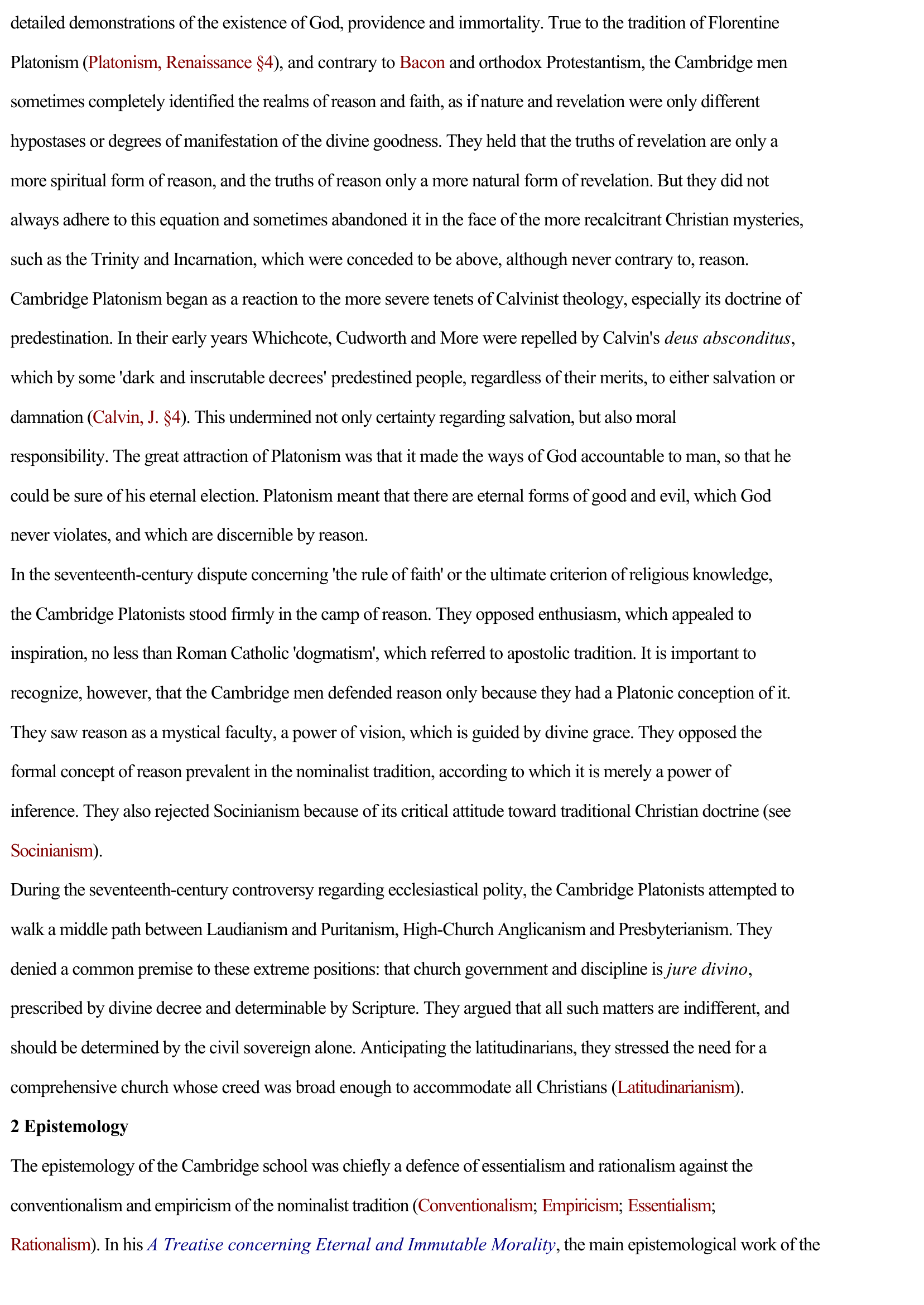Cambridge Platonism
Publié le 22/02/2012

Extrait du document
«
detailed demonstrations of the existence of God, providence and immortality.
True to the tradition of Florentine
Platonism ( Platonism, Renaissance §4 ), and contrary to Bacon and orthodox Protestantism, the Cambridge men
sometimes completely identified the realms of reason and faith, as if nature and revelation were only different
hypostases or degrees of manifestation of the divine goodness.
They held that the truths of revelation are only a
more spiritual form of reason, and the truths of reason only a more natural form of revelation.
But they did not
always adhere to this equation and sometimes abandoned it in the face of the more recalcitrant Christian mysteries,
such as the Trinity and Incarnation, which were conceded to be above, although never contrary to, reason.
Cambridge Platonism began as a reaction to the more severe tenets of Calvinist theology, especially its doctrine of
predestination.
In their early years Whichcote, Cudworth and More were repelled by Calvin 's deus absconditus ,
which by some 'dark and inscrutable decrees' predestined people, regardless of their merits, to either salvation or
damnation ( Calvin, J.
§4 ).
This undermined not only certainty regarding salvation, but also moral
responsibility.
The great attraction of Platonism was that it made the ways of God accountable to man, so that he
could be sure of his eternal election.
Platonism meant that there are eternal forms of good and evil, which God
never violates, and which are discernible by reason.
In the seventeenth-century dispute concerning 'the rule of faith' or the ultimate criterion of religious knowledge,
the Cambridge Platonists stood firmly in the camp of reason.
They opposed enthusiasm, which appealed to
inspiration, no less than Roman Catholic 'dogmatism' , which referred to apostolic tradition.
It is important to
recognize, however, that the Cambridge men defended reason only because they had a Platonic conception of it.
They saw reason as a mystical faculty, a power of vision, which is guided by divine grace.
They opposed the
formal concept of reason prevalent in the nominalist tradition, according to which it is merely a power of
inference.
They also rejected Socinianism because of its critical attitude toward traditional Christian doctrine (see
Socinianism ).
During the seventeenth-century controversy regarding ecclesiastical polity, the Cambridge Platonists attempted to
walk a middle path between Laudianism and Puritanism, High-Church Anglicanism and Presbyterianism.
They
denied a common premise to these extreme positions: that church government and discipline is jure divino ,
prescribed by divine decree and determinable by Scripture.
They argued that all such matters are indifferent, and
should be determined by the civil sovereign alone.
Anticipating the latitudinarians, they stressed the need for a
comprehensive church whose creed was broad enough to accommodate all Christians ( Latitudinarianism ).
2 Epistemology
The epistemology of the Cambridge school was chiefly a defence of essentialism and rationalism against the
conventionalism and empiricism of the nominalist tradition ( Conventionalism ; Empiricism ; Essentialism ;
Rationalism ).
In his A Treatise concerning Eternal and Immutable Morality , the main epistemological work of the.
»
↓↓↓ APERÇU DU DOCUMENT ↓↓↓
Liens utiles
- Meads Colin, né en 1936 à Cambridge (Nouvelle-Zélande), joueur de rugby néozélandais.
- EDDINGTON Sir Arthur Stanley ( 882- 944) fut astronome à l'Observatoire de Cambridge.
- E.E. Cummings par Lloyd Frankenberg Edward Estlin Cummings est né à Cambridge,
- Keynes John Maynard, 1883-1946, né à Cambridge, économiste britannique.
- Paul Dirac par Roland Omnes Maître de Conférences à l'École Polytechnique Né en 1900 à Bristol (Angleterre), Paul Dirac y fit des études d'ingénieur à l'Université avant de se tourner vers la physique et d'être reçu docteur à l'Université de Cambridge.

































